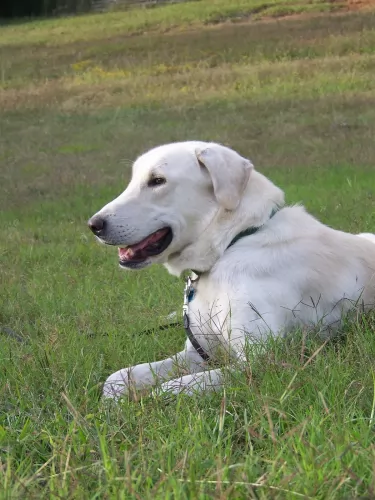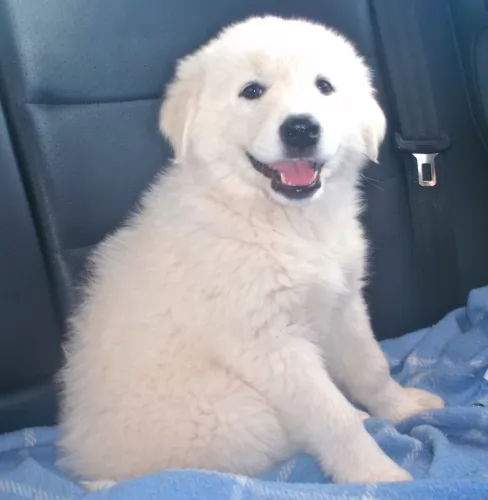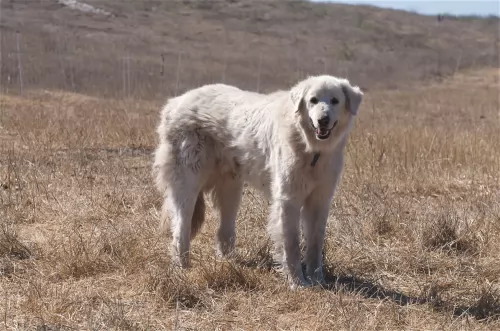 Petzlover
PetzloverAkbash Dog is originated from Turkey but Cypro Kukur is originated from India. Akbash Dog may grow 6 cm / 2 inches shorter than Cypro Kukur. Akbash Dog may weigh 25 kg / 55 pounds lesser than Cypro Kukur. Both Akbash Dog and Cypro Kukur has almost same life span. Akbash Dog may have more litter size than Cypro Kukur. Akbash Dog requires Moderate Maintenance. But Cypro Kukur requires Low Maintenance
 Akbash breed became popular in the 1970s. Around that period, Akbash was introduced to North America. There is archeological evidence that this breed was popular even in the 750-300 BC. Of course, it wasn’t the exact dog as we know it today, but there are many similarities between Akbash and dog from the ancient period. This breed was developed in Turkey to be a guardian dog. They were perfect flock guardians.
Akbash breed became popular in the 1970s. Around that period, Akbash was introduced to North America. There is archeological evidence that this breed was popular even in the 750-300 BC. Of course, it wasn’t the exact dog as we know it today, but there are many similarities between Akbash and dog from the ancient period. This breed was developed in Turkey to be a guardian dog. They were perfect flock guardians.
The Cypro Kukur is an ancient dog breed which originated in the Kumaon area of India. It is interesting to note that the name Cypro Kukur translates to Cyprus Dog, but the dog doesn’t appear to have originated in Cyprus.
The dog was used to guard livestock. It has a history that goes right back to about 300 years BC. The true history of this dog is shrouded in mystery and there are researchers who believe that foreign explorers to the Cyprus region imported these Kumaon watchdogs. There are those who believe the dog descended from the Molosser dog breeds.
The dog is also known as the Indian Mastiff or Kumaon Mastiff, but it is facing extinction with just a small number of pure Cypro Kukur remaining in the area. Today, however, there appears to be quite a large number of the dogs in Europe.
 Weight of the Akbash dog variates from 41-64kg, while their height is 71-78cm. Female Akbash is smaller than a male Akbash, but not for much.
A lifespan of an average Akbash dog is 10-11 years, but if they have cared properly, they tend to live longer.
Litter Size of Akbash is 8-9 puppies.
Another Name for Akbash is Akbas Coban Kopegi, Coban Kopegi.
Weight of the Akbash dog variates from 41-64kg, while their height is 71-78cm. Female Akbash is smaller than a male Akbash, but not for much.
A lifespan of an average Akbash dog is 10-11 years, but if they have cared properly, they tend to live longer.
Litter Size of Akbash is 8-9 puppies.
Another Name for Akbash is Akbas Coban Kopegi, Coban Kopegi.
The Cypro kukur is a large dog standing at anything from 70 – 90 cm and also weighing in the region of 70 – 90kg. He has an attractively lean, muscled body. He has a large head with a strong neck and floppy ears. The tail is long. The short, thick coat is a light fawn color with brindle markings or he can be white with black marking.
The Cypro Kukur is an aggressive dog breed and that is why he was used to guard livestock to ward off wild animals. He makes an excellent guard dog. However with training and socialization he makes an excellent family pet, becoming friendly and obedient around other pets and people.
 Have in mind that Akbash is a large and powerful dog. They are bred through generations to be guardians and suspicious. They are very independent because they tend to make their own decisions while guarding flocks. They will require adequate socialization, but overall, they are very intelligent and they tend to learn quickly. It requires time and patience, but are great pets for right owners. Akbash has a white to biscuit color coat. They also have a dark pigment around nose, eyes, and mouth. Akbash is very quick and agile dog, which might be surprised because of its size.
Have in mind that Akbash is a large and powerful dog. They are bred through generations to be guardians and suspicious. They are very independent because they tend to make their own decisions while guarding flocks. They will require adequate socialization, but overall, they are very intelligent and they tend to learn quickly. It requires time and patience, but are great pets for right owners. Akbash has a white to biscuit color coat. They also have a dark pigment around nose, eyes, and mouth. Akbash is very quick and agile dog, which might be surprised because of its size.
It is important to train them since the puppyhood. They are working dogs and they will be happy when they have tasks during training. Due to their independence, consistent and steady training is important. An old-fashioned way of training that includes punishment is not recommendable. Positive training with awards is the best way to train your Akbash dog. They do not require a lot of daily exercises. Daily walks would do more than enough. Younger dogs need more exercise than more mature ones. They can be very good for other animals, but they have to be socialized with them. It is the best way to socialize your dog when it is still a puppy.
The large Cypro Kukur is a fairly aggressive dog who makes for an excellent guard- or watch dog. It is important to have this dog trained and socialized as he can be aggressive.
He may be large and intimidating to look at with some aggressive tendencies, but with training they can become domesticated and then he has the capability of becoming quiet, well behaved and obedient.
If you’re looking for a large, loyal friend, then choose the Cypro Kukur, as with socialization he can make a good and loyal family pet.
The Cypro Kukur can live to be 10 – 12, but he is a large dog and there will be some health concerns that your dog may never develop but are worth knowing about. These are Hip Dysplasia and Gastric Torsion.
Hip dysplasia is one of the most commonly occurring conditions that dogs have to contend with so it is worth knowing about.
It is an hereditary disease that progressively gets worse with age. Your dog can be uncomfortable and in pain. Canine hip dysplasia is when the head of the femur bone doesn’t fit properly into the hip socket. Veterinarians tell us that most dogs are actually born with normal hip joints, but that gradual subluxation brings about the development of abnormally shaped hip joints.
Gastric dilatation volvulus is another name for gastric torsion, a medical condition also referred to as a twisted stomach.
Excess gas causes what is known as bloat and its a life-threatening condition that will require immediate attention from your vet.
You’ll notice your pet’s stomach is swollen, your dog will have difficulty with breathing and he may be vomiting. It is a disease brought on by a number of factors.
 Akbash dog is very easy to care. They can stay fit on a minimum amount of food. 2-2.5 cups divided into two meals would be ideal for your dog. They require meat, so giving them dry industrial food can be a solid substitute. Vegetables and oil can also be included in meals. It will keep your dog healthy and happy.
Akbash dog is very easy to care. They can stay fit on a minimum amount of food. 2-2.5 cups divided into two meals would be ideal for your dog. They require meat, so giving them dry industrial food can be a solid substitute. Vegetables and oil can also be included in meals. It will keep your dog healthy and happy.
Puppies have to eat more meals per day. It is the best to give your puppy Akbash 3-5 meals per day. Those meals should be divided into smaller portions. It is recommended to give your puppy all necessary vitamins and minerals that include calcium for stronger bones. It will improve the overall health of your dog, and it will help it develop into a healthy adult dog.
Akbash will request some grooming, but they are not very difficult to groom. They require regular grooming. Every few days will be enough, except when they are shedding. Akbash will need daily grooming when shed. You can bath your pet occasionally, but not very often. Bathing, if necessary, should be done only 5-6 times a year. There is no need for more.
This is a large dog and he will require an adequate amount of exercise. He is the kind of dog that isn’t recommended for couch potatoes. He will need to join you in your walks every day, or you can allow him to join you with your jogging or cycling.
The short coat of this large dog is easy to care for. He is a moderate shedder so a good brush twice a week will be all he needs to remove loose hairs and keep his coat healthy and shiny. Brushing him gives you the chance to check him for fleas and ticks too.
Other grooming for the Cypro Kukur should include trimming his nails and brushing his teeth twice a week with canine-approved toothbrush and toothpaste. Make a point of checking inside his ears as dogs with floppy ears are prone towards ear infections.